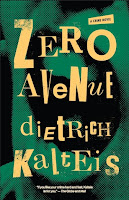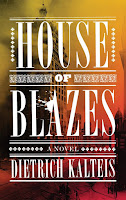Writers gather a huge miscellany of info - drafts, notes, contracts, plot ideas, pix, reviews, etc; do you have any tricks for keeping it all organized?
by Dietrich Kalteis
I don’t plot or outline my stories, it’s all seat-of-the-pants stuff, but under the surface I’m fairly organized. Electronic files and folders, that’s the key. I keep a general file on my computer for each category of what I write: novels, short stories, screenplays, etc. Then there are sub-folders for the drafts, edits, final files, cuts, reference files, character files, character names used, references, timelines, graphics, photos, marketing files, and so on.
When I finish a novel, I cull through the files and folders and toss out anything that I don’t need anymore. Clearing the clutter. And I start new ones for whatever I’m working on next. The trick is to keep it simple and organized, and in the end I just hold onto what I really need.
 Right now, I’m sifting through the final files for Zero Avenue, and except for copy edits, I’m pretty well finished the one after that, Poughkeepsie Shuffle. Meanwhile, I’m close to sending my publisher a final draft of a new story I’ve been working on, and I’ve got a longhand draft ready to key into the computer for the one after that. Then there are a couple of short stories I’ve been working on. So, with all that going on, I have to stay very organized.
Right now, I’m sifting through the final files for Zero Avenue, and except for copy edits, I’m pretty well finished the one after that, Poughkeepsie Shuffle. Meanwhile, I’m close to sending my publisher a final draft of a new story I’ve been working on, and I’ve got a longhand draft ready to key into the computer for the one after that. Then there are a couple of short stories I’ve been working on. So, with all that going on, I have to stay very organized.
I back up all electronic files on two separate drives. Everything. Every day. Hitting ‘command save’ has become a reflex — as my character Zeke Chamas from Zero Avenue might say, “It’s automatic, like scratching.” And it’s something I learned back when I was in the graphics field (saving, not scratching) — and yes, I learned it the hard way, by losing something I had been working on.
I write first drafts in longhand, keeping the pages in old-school folders. There’s something organic about working with pen in hand. Then the second draft gets keyed into my computer. I wish I could write the whole thing in longhand, but I edit and add too much, and my studio would just end up being a sea of crumpled paper by day’s end. Before the computer came along, I did type out a novel on my old Selectric. Working drafts were a mess of lines scratched out and scribbled notes, and the final draft was painted in Wite-Out and had cut strips of paper taped across the pages, not individual letters like a ransom note, but pretty close. There was never a clean final copy. It was all smoke, mirrors, correction fluid and tape by the time I had a submission ready to photocopy and send out. I guess I sometimes have this love/hate relationship with my computer, but it sure saves me a lot of time.
I still write myself little notes for whatever story I’m working on, and these litter my desk. They’re the little ideas that pop into my head and need to find their way onto the page.
 When I wrote House of Blazes I did more research than for the novels set in present-day. The setting was the 1906 San Francisco earthquake, and in addition to the usual files, I had to keep some on ships, autos, dress, which buildings were destroyed, street maps, statistics, newspapers, files on army involvement, ships involved in rescue, a time sequence of actual events that ran concurrent with the story’s events, personal accounts, and so on. When I started out, I thought all that research and organization would drive me nuts, but I actually liked it and learned so many interesting facts along the way. After which I’ve gone on to write more novels steeped in history.
When I wrote House of Blazes I did more research than for the novels set in present-day. The setting was the 1906 San Francisco earthquake, and in addition to the usual files, I had to keep some on ships, autos, dress, which buildings were destroyed, street maps, statistics, newspapers, files on army involvement, ships involved in rescue, a time sequence of actual events that ran concurrent with the story’s events, personal accounts, and so on. When I started out, I thought all that research and organization would drive me nuts, but I actually liked it and learned so many interesting facts along the way. After which I’ve gone on to write more novels steeped in history.
Back when I was writing mainly short stories, I kept lists of where each story had been submitted, often making simultaneous submissions to three publishers for each story, keeping track of rejections and what was still out there. Once a rejection came in, I’d send the story right back out to another publication, keeping track of all that.
In the end, coming up with a system that keeps me organized and avoids disaster sure gives me a lot more time for writing.

It's fascinating to see everyone's systems, Dieter. And I love that you make notes in longhand, something I do too. But I could never write a draft in longhand. I don't have the patience and I can barely read my writing most of the time. I'd have 300 pages of indecipherable gibberish. But more power to you.
ReplyDeleteIt's great getting a glimpse into all these different organizational styles, and yours is admirable. For backing up, have you considered saving to cloud?
ReplyDeleteI haven't tried Cloud, Rachel, but it sounds like a good option.
ReplyDeleteI agree that there's something organic about working in longhand. I do my best creative thinking with pen and paper.
ReplyDeleteLonghand works for me too, especially first drafts where there is that connection between the brain and the paper. A connection that lets me be more creative and free-flowing than I'm when on the keyboard.
ReplyDelete